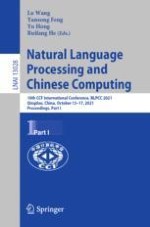2021 | OriginalPaper | Chapter
A Word-Level Method for Generating Adversarial Examples Using Whole-Sentence Information
Authors : Yufei Liu, Dongmei Zhang, Chunhua Wu, Wei Liu
Published in: Natural Language Processing and Chinese Computing
Publisher: Springer International Publishing
Activate our intelligent search to find suitable subject content or patents.
Select sections of text to find matching patents with Artificial Intelligence. powered by
Select sections of text to find additional relevant content using AI-assisted search. powered by
